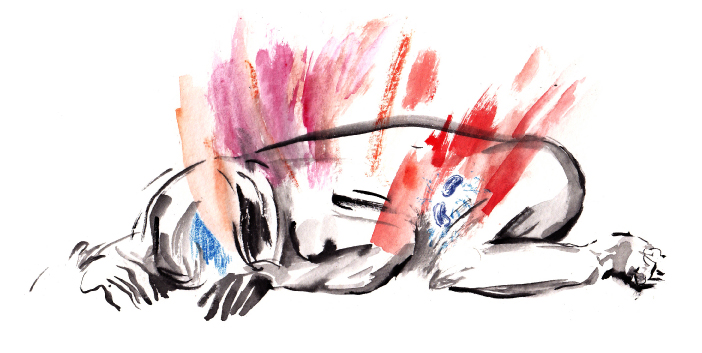
What's Wrong With Mom?
Issues in Diagnosing the Unkown
There is a condition in my family called fibromyalgia. Its main symptom is chronic and widespread muscle/tissue pain and sensitivity, but it can also result in fatigue, insomnia, migraines and a number of other unpleasant things. The brain of a person with fibromyalgia can be found to have structural and functional differences than someone who does not have it.
That is about all a Wikipedia search—or even a medical encyclopedia—can definitively tell you about it: its symptoms, and that under a big machine sufferers’ brains sometimes look different. There is no cure, and treatment success varies unpredictably for each sufferer. It seems to stem from a combination of genetic, neurobiological, environmental and psychological factors, but the actual causes are still unknown.
What I can tell you about it is that my mother and grandmother have it, and it sucks. I can tell you that just because you can’t point at a tumor, a scar or injured body part doesn’t mean they are faking it, or just being lazy when they can’t go into work. I can tell you that it isn’t easy to be told you have it—there’s something wrong with you that nobody scientifically understands; there is no surefire way to make it stop; you’re going to live with this to some degree your whole life. This is how I’ve come to understand people who suffer from things like addiction or depression.
My mother first started experiencing unexplained physical pain in early adolescence. When she went to see a physician she was told it was growing pains, but these pains never really went away, lasting long after she’d definitely stopped growing.
Unfortunately, my mom was in a couple of accidents which seem to have exacerbated her condition, while remaining undiagnosed. These included sports injuries which lead to a concussion and six months in a back brace, whiplash (neck trauma increases the risk of developing fibromyalgia) resulting from a car accident and a wooden plank dropped on her head during home renovations. Anyone would have experienced pain, headaches and a number of other symptoms following these accidents, but these occurred between 15 and 35 years ago, and the pains persist today.
Fibromyalgia is often associated with things like depression, post-traumatic stress disorder and generalized anxiety disorder. Back in 1998, there was a bomb threat at the school my mother teaches at. It was discovered that there never was a bomb. The next day, she started hyperventilating and had her first panic attack, which at first was thought to have been a heart attack. Many tests found nothing physically wrong besides herniated discs, but those wouldn’t explain an attack. So my mother was given pills to take, should it happen again, to reduce the chest compression that makes panic attacks so scary.
Over the years the pain continued and she saw various medical professionals who ruled out lupus, arthritis and multiple sclerosis before finally diagnosing fibromyalgia in 2006. Since, she’s seen doctors and specialists in rheumatology, neurology, acupuncture, physiotherapy, nutrition; she’s been prescribed different diets, exercises, vitamins, painkillers and anti-inflammatories.
One thing that stands out to me, considering what is known about both my mother’s history and the nature of fibromyalgia, is that not once was she ever recommended to see a psychologist or a psychiatrist. Her symptoms are sometimes made worse by things that really have roots in psychology, like changes in temperature or air pressure. However, I know, she knows and her doctors knows that stress—like when she had to deal with a bomb threat in a school full of children—plays a huge role in how severe her muscle pain and migraines are.
Whether fibromyalgia should be considered a medical illness or a mental disorder is a big topic of discussion in the medical and psychiatric communities. To me, this is an issue in and of itself. It is not because of my pride or my own stigma towards mental disorders that it bothers me what category my mother and others with fibromyalgia are filed under. What doesn’t sit well with me is that it’s implied that, without wholly understanding something that can cripple somebody to the point of not being able to get out of bed, people’s conditions are being categorized in a way which substantially changes how they are viewed and treated.
This seems irresponsible to me—it seems to put problems people are having in one camp or the other. If asked, my mom will tell you in all confidence that the physical pain came first, decades earlier even, before any emotional pain or sadness arose. So I understand that this is a physical problem. However, if stress, trauma and mental health have a direct impact on this problem, why after this many years has a psychological approach not been recommended? I’m curious to know if, in the case of a depressed person suffering from physical pain, would a psychologist not recommend that person go to a physician?
There seems to be an attitude in the minds of those on either side, those who treat the mind or the body, that they have all the answers. How many people might benefit from a broader view of health? What is going on within the medical community that a doctor, certainly not alone in his practice, would consider a condition which my mom suffers from daily “managed” because he cannot do anything more for her? What is going on in our society that many suffer every day without seeking help in the form of psychological or psychiatric practices?

Graphic by Graeme Shorten Adams




